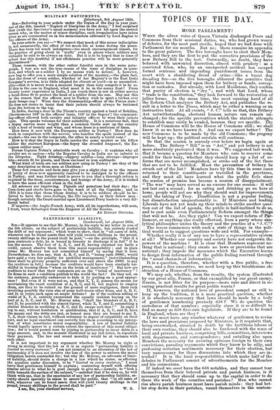PARTNERSHIP LIABILITY.
Camberwell, 1st August 1854. Sin—It appears to me that Mr. Murray, in his reply to my letter to you of the 6th ultimo, on the subject of partnership liability, has entirely evaded the drift of my argument ; which went to show, that in "all cases of debt, wherever can be found assets that will yield twenty shillings in the pound, twenty shillings in the pound shall be paid,"—on the principle, "that if a man contracts a debt, he is bound in honesty to discharge it in full" if he has the means. The fact of A, B, C, and D, having obtained too facile a credit, cannot absolve them from this moral responsibility ; and in plain terms Mr. Murray has not committed himself by saying that it does. Nevertheless, he does say, that A, B, C, and D, "losing each 50001., would have paid a very fair penalty for unskilful management," (notwithstanding there shall be private property sufficient over and above the 5000/. to pay the creditors in full,) because the creditors would have been similarly un- skilful in trusting them "when on the brink of insolvency" ! But how are creditors to know that their customers are on the "brink of insolvency " ? Do firms in such a condition publish to the world the fact ? Do they not, on the contrary, generally endeavour to hide it by putting on a good appear- once? But even if it were not so, and that Y, Z, possess the means for ascertaining the exact condition of A, B, C, and D, but neglect to employ them, are they to be ruined on the ground of mere negligence, their ruin involving possibly the ruin also of some half-dozen other firms, and A, B, C, and n, to retire each upon an ample fortune ? As if the reckless selling or credit of X, Y, Z, entirely exonerated the equally reckless buying on the part of A, B, C, and D. Mr. Murray asks, "shall the blunders of A, B, C, and D, be punished with the utmost rigour, while X, Y, and Z, committing a similar blunder in crediting A, B, C, and D, escape scot-free ? " In reply I beg to say, without hesitation or qualification, that if A, B, C, and D, have the means and the debts are just, as honest men they are bound to pay X, Y, 2, their claims in full, without reference to degree of culpability on their part, and no legal enactment oan morally free them according to my percep- tion of what constitutes moral responsibility. A law of limited liability Would legally ignore to a certain extent the operation of this moral obliga- tion; for it would permit men by joining in partnership to incur debts to a large amount, and, in the manner illustrated in my last letter, to repudiate their payment. The law and sound morality would be at variance with each other.
It is not important to my argument whether Mr. Murray be right or wrong in stating that the law as it is as regards "partnership liability is limited in every instance." I am not inimical to an alteration of the law of partnership if it does not involve the loss of the power to enforce the moral obligation herein contended for; but why Mr. Murray; an advocate of limit- ed liability, should desire a change in a law which he states, as affecting the question under discussion, to be "limited in every instance," I must leave that gentleman himself to explain ; contenting myself with offering similar advice to what he is good enough to give me,—namely, to "look a little beneath the surface of the subject,"—satisfied that if he does so, he will think with me, that in the enactment of any law of partnership liability, se- curity should specially be taken to assure the public, that "in all cases of debt, wherever can be found assets that will yield twenty shillings in the pound, twenty shillings in the pound shall be paid." I am, Sir, your obedient servant, W. S.


























 Previous page
Previous page